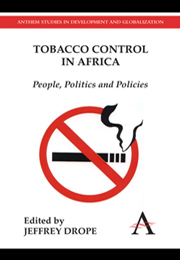Book contents
- Frontmatter
- Contents
- List of Figures and Tables
- Foreword
- Preface
- Acknowledgments
- List of Abbreviations and Acronyms
- 1 Introduction
- 2 The Political Mapping Process
- 3 Progress on Smoke-Free Policies
- 4 Taxation as a Tobacco Control Strategy
- 5 The Challenges of Implementing Bans on Advertising, Promotion and Sponsorship
- 6 The Pursuit of Packaging and Labeling Requirements
- 7 Burkina Faso
- 8 Cameroon
- 9 Eritrea
- 10 Ghana
- 11 Kenya
- 12 Malawi
- 13 Mauritius
- 14 Nigeria
- 15 Senegal
- 16 South Africa
- 17 Tanzania
- 18 Zambia
- 19 Conclusion: Tobacco Control in Africa – People, Politics and Policies
- Notes on Contributors
- Index
12 - Malawi
Published online by Cambridge University Press: 05 March 2012
- Frontmatter
- Contents
- List of Figures and Tables
- Foreword
- Preface
- Acknowledgments
- List of Abbreviations and Acronyms
- 1 Introduction
- 2 The Political Mapping Process
- 3 Progress on Smoke-Free Policies
- 4 Taxation as a Tobacco Control Strategy
- 5 The Challenges of Implementing Bans on Advertising, Promotion and Sponsorship
- 6 The Pursuit of Packaging and Labeling Requirements
- 7 Burkina Faso
- 8 Cameroon
- 9 Eritrea
- 10 Ghana
- 11 Kenya
- 12 Malawi
- 13 Mauritius
- 14 Nigeria
- 15 Senegal
- 16 South Africa
- 17 Tanzania
- 18 Zambia
- 19 Conclusion: Tobacco Control in Africa – People, Politics and Policies
- Notes on Contributors
- Index
Summary
Executive Summary
Malawi demonstrates one the lowest levels of tobacco control in Sub-Saharan Africa, having enacted almost no tobacco control legislation or regulations. It is also one of the largest producers of tobacco leaf on the continent and in the world. Not surprisingly, it has not signed the Framework Convention on Tobacco Control (FCTC). However, prospects for policy change may be brighter than one might expect under these circumstances because there is a very active civil society–based tobacco control movement and the presence of the tobacco manufacturing industry is limited compared to most countries in Sub-Saharan Africa.
The tobacco industry, in the form of the usual players such as British American Tobacco (BAT), does not appear to be a major economic and/or political player. Malawians are generally very poor and prevalence rates are relatively low, so revenues from manufactured tobacco products are limited and the large fi rms have mostly stayed away from this country. Instead, it is the leaf-purchasing companies that wield signifi cant political and economic power. To date, these companies have not had to face substantial tobacco control measures. It is diffi cult to anticipate how much resistance any new measures might face from these groups and others (particularly agricultural organizations). There is, however, already general resistance to tobacco control measures from some key parts of the government because of the economic signifi cance of tobacco leaf; the product generates greater than 60–70 percent of export exchange depending on the year.
- Type
- Chapter
- Information
- Tobacco Control in AfricaPeople, Politics and Policies, pp. 167 - 184Publisher: Anthem PressPrint publication year: 2011
- 2
- Cited by



